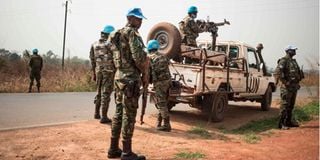Premium
Cheap land aplenty, Kenyans aware

Rwandan peacekeepers attached to MINUSCA at a check-point on the road from Bangui to Damara on January 23, 2021. Russian operatives have been accused of obstructing UN forces. PHOTO | AFP
What you need to know:
- CAR is a country that would confuse, and tempt, many Kenyans — a place with a lot of idle and cheap fertile land.
- Botswana, for one, is 581,730 square kilometres with a miserly population of 2.4 million.
The past 40 years in the Central African Republic (CAR) have been fitful. A UN peacekeeping, Minusca, has been around since 2014, holding a bandage to the country’s wounds. Among the 20 peacekeeping nations, three — Tanzania, Burundi and Rwanda — are East African.
At the end of 2020 ahead of the elections, a rebel group the Coalition of Patriots for Change (CPC), the nth in a long chain, threatened President Faustin-Archange Touadera. He went ahead with the polls and won, and in mid-January 2021 they made a move to kick him out.
An encounter with the peacekeepers, and a bilateral battalion of the Rwandan army, which operates independently and came to Bangui after Toudera called for help as rebels were on the horizon, put paid to the insurgents’ ambitions.
CAR is a country that would confuse, and tempt, many Kenyans — a place with a lot of idle and cheap fertile land. It is 622,980 square kilometres, compared to Kenya’s 580,367 square kilometres. Not too big a difference but the population of CAR is 4.8 million and Kenya’s 51.4 million — more than 10 times bigger.
Small populations living in vast lands are not a novelty in Africa. Botswana, for one, is 581,730 square kilometres with a miserly population of 2.4 million. However, nearly all of it is either semi-arid or desert.
Effect of insecurity
The population of CAR is nearly the same as Nairobi County. To spice things up, 2.5 million of them live in the capital Bangui. With most of the rest living in towns, most of the fertile land is just out there.
You drive around Bangui and learn quickly that most of the food comes from neighbouring Cameroon. The Central Africans are not famous for farming. Foreigners tend to sneer at them, calling them lazy. It is an ahistorical view because, for reasons of colonial history and destabilising effect of insecurity, folks here don’t invest their energy and effort in farming. A farmer needs to be sure that if she plants her maize, she will be able to harvest and sell it. If, however, they plant it and there is chaos, and flee, leaving rebels to feed off their crop, after one generation they will simply not farm anymore.
The result is that land is cheap. A diplomat and peacekeeping officer both told me that for $1,000 (Sh114,410) you can buy (I think they meant lease) up 150 acres in some parts of the country. It sounded too good to be true. Maybe 50 acres.
Whatever the case, East Africans — including quite a few Kenyans — have smelt the opportunities and reports in Bangui speak of dozens of them arriving in the country to sniff around, and some Rwandans are reported to already be farming.
East African airlines also seem to have cornered this end of the market. In the cramped Bangui M’Poko International Airport, Kenya Airways, RwandAir and Ethiopian Airlines are the big boys and girls, bringing in what I predict could, soon, be a flood of East African go-getters and hustlers.
African peacekeepers
It is possible that a new wave of pan-African mingling might just provide the fresh juice CAR needs to rebuild. For now, it is blanketed by a colonial narrative. Former colonial and post-independence imperial power France is the evil empire, blamed for many of the country’s woes.
One of the most outrageous popularly held narratives is about David Dacko, who was the first president of the country from August 14, 1960 to January 1, 1966, when he was ousted in a coup. He returned as its third president from September 21, 1979 to September 1, 1981, when he was ejected from power a second time by soldiers.
It is alleged that Dacko signed a deal with the French which provided that anything below five feet in CAR’s ground belongs to Paris. The French are said to have exercised their option vigorously in this mineral-rich nation and, for 60 years, have carted off to France the rich pickings of CAR in secret planes to enrich themselves.
It was impossible to ascertain if any of this is true. What is clear is, it is widely believed. It seems some of it is espoused to explain away the bitter reason for CAR’s recent struggles and to reconcile the contradictions in which it feels trapped.
For example, CAR is overflowing with mangoes but the residents hardly eat them fresh. When the African peacekeepers arrived and they took to eating fresh mangoes, the locals laughed at them, thinking they were not sufficiently civilised. The mangoes are, thus, obtained cheaply and exported, mostly to France, and returned as juice — which the Central Africans love, and pay good money for.
There is an optimistic view that the African face of CAR peacekeeping will help to solve a problem it wasn’t meant to. Seeing African armies, with big guns, driving around in menacing vehicles, keeping away rebels alleged to be backed by “imperialists”, might just give the Central Africans the ability to believe that there is, in Africa, a power far greater than the Big Bad European Man. Who knows?
Mr Onyango-Obbo is a journalist, writer and curator of the Wall of Great Africans. @cobbo3





